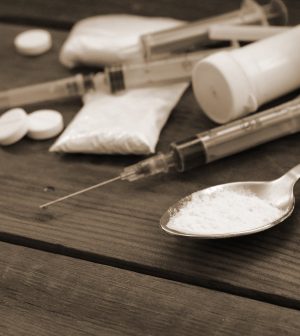- Could Your Grocery Store Meat Be Causing Recurring UTIs?
- Are You Making This Expensive Thermostat Error This Winter?
- Recognizing the Signs of Hypothyroidism
- 10 Strategies to Overcome Insomnia
- Could Artificial Sweeteners Be Aging the Brain Faster?
- Techniques for Soothing Your Nervous System
- Does the Water in Your House Smell Funny? Here’s Why
- Can a Daily Dose of Apple Cider Vinegar Actually Aid Weight Loss?
- 6 Health Beverages That Can Actually Spike Your Blood Sugar
- Treatment Options for Social Anxiety Disorder
U.S. to Fund Study on Safe Drug Injection Sites for Overdose Prevention

The U.S. federal government has committed $5 million to study three existing and planned safe drug injection sites to see if they help prevent overdoses and whether they may offer savings in the health and criminal justice systems.
At these overdose prevention centers (OPCs), people can use heroin or other illegal drugs under supervision so they can potentially be revived if they overdose.
The funding would not pay to operate the sites, but to study two now open in New York City and a third that’s opening next year in Providence, R.I. Researchers from New York University and Brown University expect to enroll about 1,000 adult drug users.
“We have an unprecedented opportunity to study the first publicly recognized overdose prevention centers in the country across two different states, as well as the impact on the communities in which they operate,” said Magdalena Cerdá, director of NYU Langone’s Center for Opioid Epidemiology and Policy and one of the study’s lead investigators.
“This research is urgently needed to inform policies that can best support public health, as more jurisdictions across the country consider implementing OPCs,” Cerdá said in an NYU news release.
These sites can be controversial, with some worrying they will do damage to surrounding neighborhoods and encourage drug use. Supporters say they can save lives and help people find addiction treatment and other medical services, the Associated Press reported.
“There is a lot of discussion about overdose prevention centers, but ultimately, we need data to see if they are working or not, and what impact they may have on the community,” said Dr. Nora Volkow, director of the National Institute on Drug Abuse (NIDA), which awarded the grant.
About 107,000 died of drug overdoses in 2021 in the United States, according to NIDA.
Existing injections sites operate in 14 countries, including Canada, Australia and France. New York City opened the first publicly known U.S. site in 2021.
It’s possible they’ll grow to include other states, but bills allowing them were vetoed last year by governors in California and Vermont. The Pennsylvania Senate banned them last week, the AP reported.
The White House’s drug control strategy emphasizes harm reduction, which focuses on getting care for people who use drugs rather than punishing them, and the U.S. Justice Department allows the sites.
The U.S. National Institutes of Health is studying programs offering services and supplies that can reverse overdoses and test drugs for fentanyl. This new study is a part of that project, the AP reported.
More information
The University of Southern California has more on safe injection sites.
SOURCES: Associated Press, NYU Langone, news release, May 8, 2023
Source: HealthDay
Copyright © 2026 HealthDay. All rights reserved.










